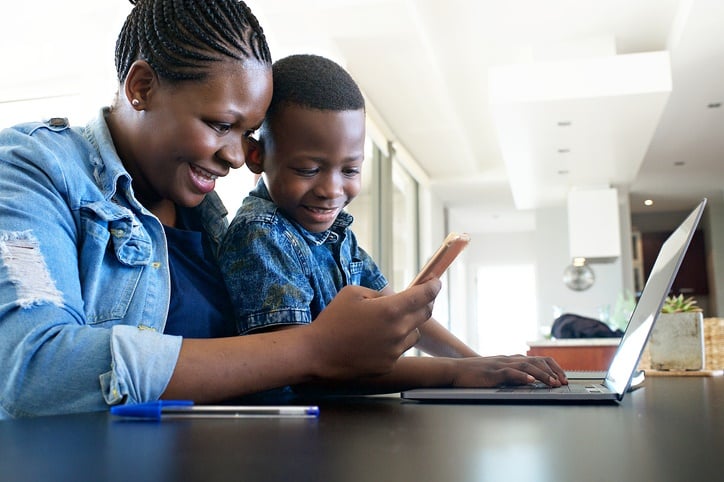
Almost universally, one of the first measures taken to contain the spread of Covid-19 was the closure of schools, colleges and universities. This has affected over 1.576 billion learners, constituting slightly over 91% of enrolment.
In Africa, about 297 million learners have been affected. Their teachers and resources, will remain underutilised for a while. The question for society is, “what next”? This is a valid concern given that no one is certain how long the health crisis will last.
At the national and school levels, education technology (also known as EdTech) is closing the learning gap. In particular, virtual classrooms, TV, radio and online platforms have been activated or strengthened to support learning at a level that we’ve not seen before both inside and outside Africa.
Broadly, learning continues through mass communication and internet-based resources. However, even within countries, the experience is uneven.
Given that school closures were abrupt, about 75% of learners have limited or no access to interactive and internet-based learning materials. Such materials are open access but unreachable mainly due to connectivity related challenges.
At the moment, the main focus is providing learning opportunities and reach. But moving forward, countries will need to look at how effective the innovations are, how many people can access them and whether it’s sustainable.
- OPINION: What going back to school post Covid-19 could look like
- This new digital portal combines stories and play to help children think out of the box
- Online schooling? Find handy local resources here
The response
Unesco’s most recent assessment shows the EdTech tools are common in middle income African countries, reach many students and while some require a subscription, majority offer free access. But a majority require internet connectivity and over 95% of the innovation took place outside Africa.
The education technology products at the disposal of education systems and schools come with different capabilities and the education managers will have to use their discretion to choose what could work in their contexts.
For example, a long-running school radio programme set up to reach remote areas in Kenya recently got a new lease of life. It is now broadcasting nationally to over 12 million primary and secondary school learners – a jump in utilisation to over 90% from 23% in 2013.
At the moment the effectiveness of educational technology depends on the strength of national networks and connectivity to technology.
It’s dependent on service providers and the devices at the disposal of schools, parents and learners, such as smartphones. To add to these are country-specific market realities, such as taxes and incentives.
Such efforts will be more effective if complemented with smartphone penetration. This currently stands at far below 50% of the total population in most countries. A 2017 survey showed that smartphone penetration was at 51% in South Africa, 30% in Kenya and 13% in Tanzania.
In Africa, internet penetration in March 2020 stood at 39.3% of the total population compared to the rest of the world at 62.9%.
In a few countries such Ghana and South Africa, smartphone and internet penetration seem to go hand in hand, but for other countries such as Kenya, Nigeria and Senegal, internet penetration is way ahead of smartphone penetration.
These statistics have implications of interactive homeschooling support and communications between the teacher and learners at home.
Implications
The Covid-19 crisis presents an opportunity to strengthen education technology in Africa. This could lead to less reliance on on-campus instructional delivery and create an ecosystem that allows learners in both public and private institutions access digital learning materials.
One way to do this is by making smartphones more accessible to more people by, for example, zero-rating smartphones and providing subsidised WiFi in low resource environments.
This would close the digital divide gap created by inability to pay for internet services. It would also increase access to internet devices to match internet penetration.
Technology and digital solution developers, information service providers and governments will have to join other education stakeholders to close the technological learning gaps sooner than later.
The other implication is the need to use this opportunity to design and provide alternative contextualised cost-effective learning delivery channels that could outlive Covid-19.
These could address some service delivery gaps predating the crisis. These include the weak mechanisms to reach those farthest left behind, special needs children and managing the cost of schooling.
It must not be forgotten that parents and guardians have to work remotely to support the learning ecosystem by providing care, support and supervision to children’s home learning. Much as it is a good bonding opportunity, they also at the same time have to attend to work related demands.
Employers should therefore lower their expectations – perhaps they have already done this – on employee productivity. Of course for some employees, working remotely could actually enhance productivity especially if they remain organised, focused and motivated.![]()
Moses Ngware, Senior Research Scientist, African Population and Health Research Center
This article is republished from The Conversation under a Creative Commons license. Read the original article.
Chat back:
Share your story with Parent24. Anonymous contributions are welcome.
WhatsApp: Send messages and voicenotes to 066 010 0325
Email: Share your story with us via email at chatback @ parent24.com




 Publications
Publications
 Partners
Partners











